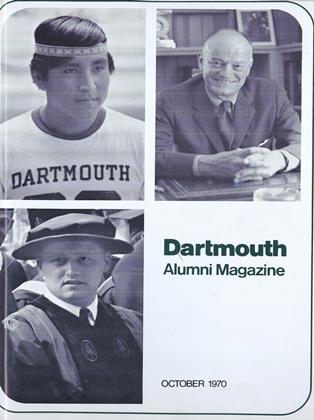Dartmouth’s eighth summer term had an enrollment of 460 students, including 128 undergraduates of the College. This total included 70 secondary-school teachers enrolled in the New Master of Arts in Liberal Studies Program, which normally will require four summers to earn the degree. Other educational programs and conferences brought another 1400 persons to the campus. The entire summer program, including the art, music and film events at Hopkins Center, was supervised by Gregory S. Prince Jr., who recently came from Yale to be Director of Summer Programs.
Project ABC ran two four-week sessions this summer and 240 boys and girls were enrolled in this seventh annual program for educationally disadvantaged students. The 120 Indian American, Puerto Rican, black, and white students who attended each session were from grades eight through eleven. After their ABC courses in English, mathematics, and reading they are placed in private or public schools allied with ABC and there finish preparation for college. Currently 110 private schools and 16 public high schools are accepting Project ABC students from Dartmouth and a few other colleges. These schools are mostly in New England, with several in Minnesota and Wisconsin.
Sports in Hanover over the summer were highlighted by three weeks of training by two dozen candidates for the U. S. Olympic track and field team, and by the national canoe racing championships on the Connecticut Riv- er, August 22-23. The annual Maple Sugar Football Game, sponsored by the Shriners for the benefit of their chil- dren’s hospitals, was again held in Memorial Stadium and was preceded by a colorful parade with bands and costumed Shriners from all over the Northeast and Canada. David E. Orr ’57, Assistant Secretary of the College, was general chairman of the event, which pitted the best high school players of New Hampshire against those of Vermont. Illustrious Potentate Kenneth E. Nicholson ’45 and Noble Harold O. Stanton ’35 were among the dignitaries.
David T. McLaughlin ’54, president of Toro Manufacturing Cos. of Minne- apolis, has been named chairman of the Board of Overseers of Tuck School. He succeeds James P. McFarland ’33, president of General Mills Cos., who served as chairman for the past two years. McLaughlin is past president of the Class of 1954 and of the Dartmouth Alumni Association of Chicago. Earlier this year he returned to Tuck School for a week as Businessman-in-Resi- dence, a program intended to promote communication between successful busi- ness leaders and executives of the future.
Those future business leaders start off with substantial pay. The average starting salary for M.B.A. graduates of Tuck School this year was $14,254. That was a 6% increase over the start- ing salary for the Class of 1969, which itself registered a 16.5% increase over the year before. For Tuck’s 1970 graduates, the range of accepted offers was from $11,500 to $lB,OOO, and the average number of offers per graduate was 3.7.
According to 1970 census figures, Hanover’s population in the past ten years has grown from 7329 to 8480, an increase of 15.7%. The town is creeping up on Lebanon, which although ranked as a city, grew from 9299 to only 9632.
The football season is the appropriate time to report that Harvard claims it takes six men three days to clean up the Harvard Stadium after the Dartmouth game. “Extensive scientific research,” says their story, “has established that the more powerful the team with which Harvard does battle, the more copious the droppings. Dartmouth has always produced the most garbage, seconded closely by Yale and Princeton. Non-Ivy crowds are considerably more tidy. After the Dartmouth game, a five-ton truck carries the refuse away, and the traditional party after the game, at Briggs Cage, yields another two-and-a- half-ton truckload.”
President John Kemeny greeted part of the first freshman class to enter Dartmouthunder his presidency when he met with them at Moosilauke Ravine Lodge onFriday evening, September 11. The students shown were among the more than350 freshmen who came to Hanover early for the Freshman Trip sponsoredannually by the Dartmouth Outing Club. Going out of Hanover in four groups,on a staggered basis, the freshmen spent two and a half days in the outdoors ofnorthern New Hampshire and then two days at the Ravine Lodge. This operation,aided by 70 student patrol leaders, ran from September 7 to the 17th, on whichdate the entire freshman class of 820 men gathered in Hanover for the start ofthe Freshman Week orientation program. Other College officials who spoke tothe freshmen at the Ravine Lodge were Provost Leonard M. Riser ’44, DeanCarroll W. Brewster, and Dean of Freshmen Albert I. Dickerson ’3O.
 View Full Issue
View Full Issue
More From This Issue
-
 Cover Story
Cover StoryLiberating the Ph.D.
October 1970 By Robert B. Graham ’40 -
 Feature
FeatureEleazar Is Outdone
October 1970 By Charles Jay Kershner -
 Feature
FeatureThe Dickeys Get Resettled
October 1970 -
 Article
ArticleDear Mr. Cunningham . . .
October 1970 -
 Article
ArticleFaculty
October 1970 By William R. Meyer -
 Sports
SportsBig Green Teams
October 1970 By Jack DeGange







